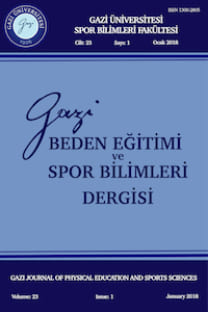PROFESYONEL FUTBOLCULARIN KAPTAN OLUP-OLMAMALARINA GÖRE PSİKOLOJİK BECERİLERİNİN ARAŞTIRILMASI
Araştırmanın amacı, profesyonel futbolcuların kaptan olup-olmamalarına göre psikolojik becerilerinin (imgeleme, baskı altında doruk performans, bağlılık gösterme, stresle başa çıkma ve karşılaşma kaygısı) araştırılmasıdır. Araştırmanın evreni Türkiye Futbol Federasyonunun 7. bölgesi olan Güney-Anadolu illeridir. Bu bölgedeki 18 profesyonel futbol takımı ve 451 profesyonel futbolcudan toplam 308’ ine ulaşılmıştır. Bu araştırmada yukarıda belirtilen 5 psikolojik beceriyi değerlendiren "Futbolda Psikolojik Beceriler Ölçeği-16 (FPBÖ-16)’dan" ve profesyonel futbolcuların kaptan olup-olmamalarıyla ilgili ankete verdikleri cevaplardan yararlanılmıştır. FPBÖ-16’nın güvenilirlik katsayıları, imgelemede .66, baskı altında doruk performansta .73, bağlılık göstermede .62, stresle başa çıkmada .68 ve karşılaşma kaygısında ise .63’ tür. Tek yönlü varyans analizi ve Scheffe Testi analizlerine göre, profesyonel futbolcuların imgeleme, baskı altında doruk performans ortaya koyma, stresle başa çıkma ve karşılaşma kaygısı becerileri ile kaptan olup-olmamaları arasında anlamlı bir farklılık bulunmazken (P>.05) sadece anlamlı farklılık bağlılık gösterme becerisi ile kaptan olup olmama arasında bulunmuştur (F: 3.52 ve P<.03). Analiz sonuçları, kaptanların kaptan olmayanlara göre, orta düzeyde bağlılık gösterme becerisine sahip olduğunu göstermiştir (P<.04).
Anahtar Kelimeler:
Psikolojik Beceriler, Profesyonel Futbol, Kaptanlık, Performans
AN INVESTIGATION OF PSYCHOLOGICAL SKILLS OF PROFESSIONAL SOCCER PLAYERS ACCORDING TO BEING A TEAM CAPTAIN OR NOT
The purpose of this study is to investigate psychological skills (imagery, peaking under pressure, commitment, coping with stress and competitive anxiety) according to being the captain or not. Population of this study consisted of 18 professional soccer teams and 451 professional soccer players of "7 th. South Anatolia Region" categorized by the Soccer Federation of Turkey. All professional soccer teams and total 308 professional soccer players were used in this study. Soccer Psychological Skills Scale-16 (SPSS-16) with a questionnaire was applied to 308 professional soccer players and data gathered about psychological skills and perception of chievement of professional soccer players. Reliability coefficients of the SPSS-16 are .66 for the imagery, .73 for the performing under pressure, .62 for the commitment, .68 for the coping with stress and .63 for the competitive anxiety. The results of the One-Way ANOVA and Scheffe Test showed a only meaningful difference between commitment and being the team captain (F: 3.52 ve P< .03).Results of analysis were revealed that captains have medium commitment skill than other team players.
Keywords:
Psychological Skills, Professional Soccer, Captaincy, Performance,
___
- 1. Anshel, M. H., Freedson, P. Hamill, J. Haywood, K. Horvat, M. Plowman, A. S. (1991). Dictionary of The Sport and Exercise Sciences. IIIinois: Human Kinetics Books, 97, 110-111, 128, 134, 146-147.
- 2. Smith., E. R., Christensen, S. D. (1995). Psychological Skills as Predictors of Performance and Survival in Professional Baseball. Journal of Sport and Exercise Psychology, 17, 399-415.
- 3. Rees, C. R. (1983). Instrumental and Expressive Leadership in Team Sports: A Test of Leadership Role Differentiation Theory. Journal of Sport Behavior, 6, 17-27.
- 4. Murphy, S. M. (1994). Imagery Interventions in Sport. Medicine and Science in Sports and Exercise, 26, 486-494.
- 5. Pargman, D. (1998), Understanding Sport Behavior. New Jersey: Prentice Hall, 48, 279, 287, 293-94, 296-97.
- ISSN: 1300-2805
- Yayın Aralığı: Yılda 4 Sayı
- Başlangıç: 1996
- Yayıncı: Gazi Üniversitesi
Sayıdaki Diğer Makaleler
ATLETİK YETERLİK DÜZEYİ VE CİNSİYETİN BEDEN EĞİTİMİNE YÖNELİK TUTUM ÜZERİNE ETKİSİ
BEDEN EĞİTİMİ ÖĞRETMENLERİNİN İŞ DOYUM DÜZEYLERİNİN KARŞILAŞTIRILMASI
Deniz DEMİRCAN, Gıyasettin DEMİRHAN
Mehmet Yalçın TAŞMEKTEPKİLGİL, Özgür BOSTANCI, Tülin ATAN, Musa ÇON
FEDERASYON BAŞKANLARININ SPOR FEDERASYONLARININ ÖZERKLİĞİNE İLİŞKİN GÖRÜŞLERİNİN DEĞERLENDİRİLMESİ
Esra ERTURAN ÖĞÜT, Fatih YENEL
Zafer AKTAŞ, Gökhan ÇOBANOĞLU, İlknur YAZICILAR ÖZÇELİK
PROFESYONEL FUTBOLCULARIN KAPTAN OLUP-OLMAMALARINA GÖRE PSİKOLOJİK BECERİLERİNİN ARAŞTIRILMASI
